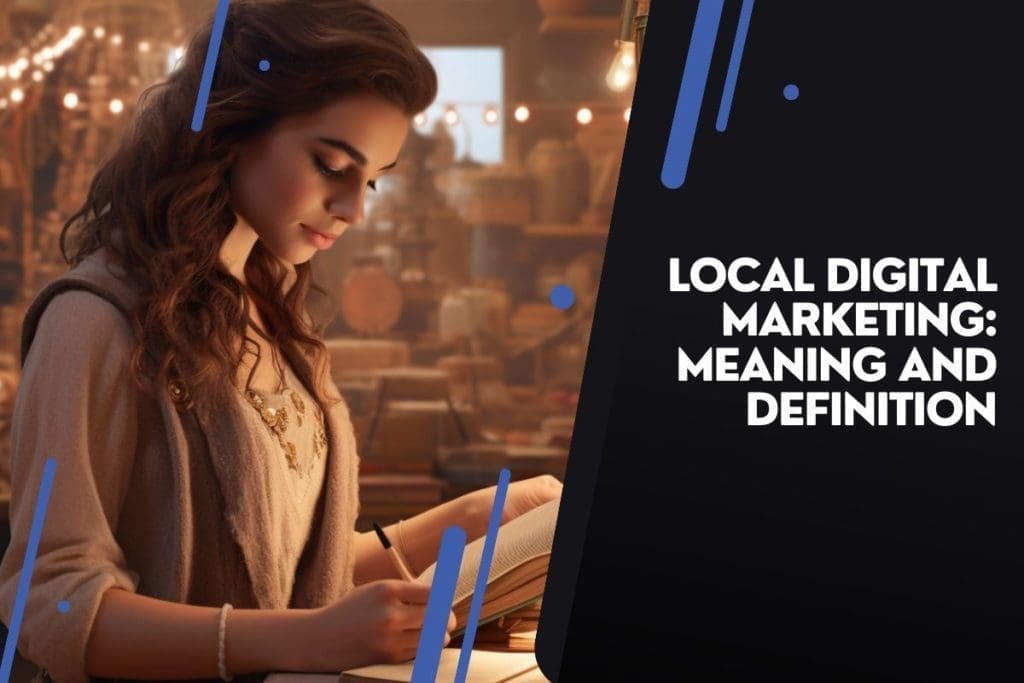Local Digital Marketing Meaning and Definition

Do you want to understand local digital marketing? You’ve come to the right place! In this article, you will get a clear understanding of what local digital marketing is. Plus, what it entails and how it works. Let’s get started!
What Is Digital Marketing?

Two women engaging in local digital marketing on a laptop in an office setting.
Digital marketing uses digital channels and platforms to advertise products, services, and brands. There are various strategies involved in online marketing, such as SEO, social media, email, and content marketing. Businesses can use the internet to reach a larger audience and communicate with potential customers in a personalized manner.
Establishing an online presence is crucial for companies in today’s digital world. Digital marketing helps them reach their target market on the platforms they visit most. This boosts brand recognition, website traffic, leads, and sales.
Search engines are one of the main places people research items before buying. SEO is vital for digital marketing. By optimizing websites and content for relevant keywords, businesses can rank higher in search engine results pages and get organic traffic.
Social media is essential for digital marketing. Platforms such as Facebook, Instagram, Twitter, and LinkedIn offer companies the chance to interact with followers through posts, stories, videos, and ads. This fosters brand loyalty and allows businesses to gather info about their target audience via analytics tools.
Digital marketing has an advantage: measurable results. Unlike traditional advertising, which is hard to track, digital marketing campaigns can be monitored in real-time. Marketers can assess metrics such as website traffic, conversion rates, click-through rates, and ROI to determine their campaign success.
Businesses must use digital marketing to stay ahead in the competitive business landscape. The benefits are clear: increased visibility, better targeting, improved customer engagement, greater conversions, and revenue growth.
Don’t miss out on digital marketing! Use it to connect with your audience in a meaningful way and drive success for your brand. Get ready to embrace local digital marketing – or you may be famous for missing out on all the new customers.
Why is Local Digital Marketing Important?

A man of African descent utilizing a laptop at a local cafe.
Local digital marketing is a must for businesses hoping to build connections with their target audience in certain areas. With mobile devices and local searches becoming more popular, companies can’t just use traditional methods.
Today, customers look for products and services online. Local digital marketing gives businesses the chance to use targeted ads to reach people who want what they offer. Strategies like SEO, PPC, and social media marketing help businesses appear at the top of local searches.
Businesses can build trust and credibility in their community with local digital marketing. When local people see a business in search results or get recommended online, they’re more likely to choose that business.
Plus, businesses can track and measure their campaigns precisely. Analytic tools give them insights into consumer behavior, preferences, and demographics. This helps them adjust their strategies and services to what their target audience wants.
For effective local digital marketing, update business listings across different directories and review platforms. Being on Google My Business, Yelp, and Facebook makes businesses more visible in local searches.
To sum it up, local digital marketing is essential in today’s digital age. Targeted ads and online platforms help businesses reach their target audience and grow. It’s like a magician’s trick: digital marketing makes businesses move from the last page of search results to the front!
How Digital Marketing Works
Digital Marketing is the powerhouse that takes businesses into the online world. Companies can reach their target audience more easily than ever by utilizing various digital channels like social media, search engines, and email marketing.
Strategic planning and execution can create a strong online presence for businesses that resonates with customers. Researching customer needs and preferences through market research is key. Knowing the target audience allows businesses to customize their marketing efforts to meet those needs.
- Search engine optimization (SEO) is one part of digital marketing. It focuses on improving website visibility in search engine results. Optimizing keywords, making high-quality content, and forming authoritative backlinks all help boost a website’s ranking. This leads to more organic traffic, brand exposure, and potential customer acquisition.
- Social media advertising is another part of digital marketing. Platforms such as Facebook, Instagram, and Twitter offer targeting options that let businesses reach the desired audience. Utilizing these campaigns can bring leads and conversions.
- Email marketing is another essential part of digital marketing. By forming an opt-in email list, businesses can stay in touch with customers and give them personalized offers and updates. Targeted email campaigns help nurture relationships and drive repeat purchases.
The idea of digital marketing has been around since the 1990s, along with the rise in popularity of the Internet. As technology advanced, so did digital marketing. It started with emails and banner ads, but it’s now a multi-faceted approach that covers social media platforms and search engines.
Key Performance Indicators (KPIs) in Digital Marketing
Key Performance Indicators (KPIs) in Digital Marketing are metrics used to measure the success of campaigns. They offer insight into the performance and influence of marketing tactics. Marketers can make decisions based on data to optimize their campaigns and reach their goals by analyzing KPIs.
Let’s take a closer look at some KPIs in digital marketing. The table below lists some common metrics along with their definitions and examples:
| Metric | Definition | Example |
|---|---|---|
| Impressions | The number of times an ad is displayed on a user’s screen | 10,000 impressions in one week |
| Clicks | The number of times users click on an ad or a link leading to your website | 500 clicks in one month |
| Conversion Rate | The percentage of visitors who take desired actions on a website | 2% conversion rate on an e-commerce site |
| Cost per Acquisition | The amount spent to acquire each new customer | $1 cost per acquisition for a newly acquired lead |
| Return on Ad Spend | The amount of revenue generated compared to the money spent | 4:1 return on ad spend ($4 revenue for every $1 spent) |
Other metrics like bounce rate, average session duration, customer lifetime value, and social media engagement can also help evaluate digital marketing performance.
Now let’s explore the history of KPIs in digital marketing. Marketers saw the need for objective metrics to measure campaign success as the industry progressed. This is how KPIs were created. Today, these metrics are essential for making informed decisions and optimizing digital marketing campaigns for maximum impact.
Digital marketing challenges: like trying to find your way through a maze with no sight while someone keeps changing the walls and rules.

A businessman standing in front of a labyrinth, symbolizing the meaning and definition of local digital marketing.
Digital Marketing Challenges
Digital marketing is ever-evolving, needing constant adaptability. With tech advancing and consumer behavior constantly shifting, marketers must work hard to stay ahead in the digital world.
One obstacle? Saturation of online platforms. With more businesses recognizing the need for an online presence, competition increases, and marketers must find creative ways to stand out and grab attention.
Search engine algorithms and social media platforms change regularly, so marketers must stay up-to-date and optimize strategies accordingly.
Data protection regulations, such as GDPR, also present a challenge. Marketers must understand these regulations and take measures to protect user privacy while still providing personalized experiences.
Digital marketing has changed massively since Yahoo was established in 1994, and since then, many developments have formed the digital marketing world. Despite its sophistication, digital marketing still has its limitations – like a robot with outdated software.
Implicit Bias in Digital Marketing
Digital marketing is a necessity for businesses today, but it can come with hidden risks. Implicit bias in digital marketing refers to unconscious biases that shape how ads are targeted and presented. Such bias can be based on race, gender, age, or socioeconomic status, leading to unequal opportunities.
Marketers must recognize the presence of implicit bias. Take proactive steps, like diversifying teams and incorporating ethical guidelines. This way, campaigns can reach a broader audience without perpetuating harm.
Don’t limit your potential with implicit bias. Encourage diversity and inclusivity in your approach. Create a fair digital landscape for everyone. Take action now!
Boost your small business’s online presence with local digital marketing ideas. Success is just a few clever clicks away!
Local Digital Marketing Ideas for Your Small Business

Two women engaged in local digital marketing study while examining a tablet at a desk.
Local digital marketing is key for small businesses to succeed in today’s competitive market. It means utilizing online tactics to target customers in a particular geographic area. Here are some creative and effective local digital marketing moves:
- Construct a mobile-friendly website: Make sure your site is responsive and well-suited for mobile devices. This will upgrade the user experience and raise the chances of conversions.
- Use local SEO: Improve your website with local keywords, meta tags, and descriptions. This will aid search engines to link your business with potential customers in your area.
- List your business on online directories: Make sure to claim your profile on popular directories like Google My Business, Yelp, and Yellow Pages. This will make it easier for local clients to find you when they search online.
- Interact with social media: Establish a strong presence on social media platforms like Facebook, Instagram, and Twitter. Share valuable content, interact with followers, and run targeted ads to reach a wider local audience.
To take things further, here are more tips:
- Update your website regularly with new content to increase its visibility on search engines.
- Ask pleased customers to leave positive reviews on online review sites. Reviews are crucial in influencing potential customers’ decisions.
In conclusion, using these local digital marketing ideas can expand your reach within the community while growing brand awareness and customer engagement. So get creative and start using the power of digital marketing today!
Effective Local Digital Marketing Campaigns
Local marketing can help businesses gain visibility and attract customers. To do this, you need the right strategies. Here are some tactics to consider:
- Localized SEO: Optimize your website and content with location-specific keywords. This will improve search engine rankings for local searches.
- Location-Based Advertising: Use platforms like Google Ads and Facebook Ads to target consumers in specific areas.
- Online Directories: List your business on popular directories such as Google My Business, Yelp, and Yellow Pages.
- Social Media Targeting: Leverage social media to target users based on their location and interests.
You should also regularly monitor and analyze your campaigns. Use tools like Google Analytics or social media insights to gain insights.
By combining these strategies, businesses can create effective local marketing campaigns. And don’t forget to refine and adapt your approach based on results and feedback. Data-driven decisions will maximize campaign effectiveness.
Wrapping it Up

A group of local women discussing digital marketing strategies at a table.
In conclusion, local digital marketing is a powerful tool for businesses to connect with their target audience in specific areas. By utilizing various online strategies like SEO, social media, and email marketing, businesses can reach a larger audience and communicate with potential customers in a personalized manner. It is essential for companies to establish an online presence in today’s digital world to boost brand recognition, website traffic, leads, and sales. Additionally, the measurable results of digital marketing campaigns allow marketers to assess their success and make data-driven decisions to optimize their strategies. Embracing local digital marketing is crucial for staying ahead in the competitive business landscape and unlocking the potential for increased visibility, improved customer engagement, and revenue growth. Don’t miss out on this opportunity to connect meaningfully with your audience and thrive in the digital age!
Frequently Asked Questions
Q: What is the meaning of local digital marketing?
A: Local digital marketing refers to the strategies and techniques used to promote products or services to a targeted audience within a specific geographical area using online channels such as search engines, social media, email marketing, and websites.
Q: How does local digital marketing differ from traditional marketing?
A: Unlike traditional marketing, which focuses on reaching a broader audience, local digital marketing aims to target customers within a specific location. It leverages online platforms to connect businesses with local consumers and drive foot traffic to physical stores.
Q: What are the key components of local digital marketing?
A: The key components of local digital marketing include search engine optimization (SEO) to improve local search rankings, local business listings, online reviews management, localized content marketing, targeted social media advertising, and location-based targeting.
Q: Why is local digital marketing important for businesses?
A: Local digital marketing allows businesses to reach their target audience precisely, increase brand visibility within the local community, and drive more foot traffic to physical locations. It helps businesses connect with local customers who are more likely to convert into leads or sales.
Q: How can businesses measure the success of their local digital marketing efforts?
A: Businesses can measure the success of their local digital marketing efforts through various metrics such as website traffic, online reviews, and ratings, click-through rates (CTR) on local ads, conversion rates, phone calls generated, and foot traffic to physical stores.
Q: Are there any specific tools or platforms for local digital marketing?
A: Yes, there are several tools and platforms available for local digital marketing. Some popular ones include Google My Business, Yelp, Facebook Ads Manager, Hootsuite, Moz Local, and SEMrush. These tools help businesses optimize their local online presence and effectively manage their digital marketing campaigns.
